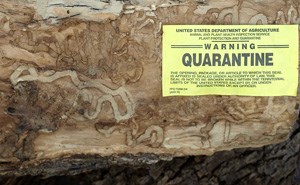
NPS Photo Destructive Insect PestsDestructive insects and diseases can be transported in firewood. The forests of Great Smoky Mountains National Park could be devastated by these insects. Emerald ash borer has killed tens of millions of ash trees in North America since its discovery here in 2002. The insect is originally from Asia, but was accidentally introduced to North America. The adult beetles eat ash foliage but cause little damage. The larvae (the immature stage) feed on the inner bark of ash trees, disrupting the tree's ability to transport water and nutrients. More information about emerald ash borer is available from:
Asian longhorned beetle is native to Asia, but has been found in Ohio, Illinois, Massachusetts, New Jersey, and New York recently. Most Asian longhorned beetle infested trees have been in landscape settings so far. These beetles lay eggs on trees and their young bore through trees as they grow. Infested trees must be cut, chipped, and burned to prevent spread. More information about Asian longhorned beetle is available from: Thousand Cankers Disease poses a serious threat to black walnut trees in the national park. The disease is caused by a non-native fungus which is transmitted by small twig beetles. For information about the disease, please visit:
Don't Move Firewood!Visit the Don't Move Firewood! website for a wealth of information, including state-by-state updates on threats, interactive games, entertaining videos, insect identification, and ways you can help stop the spread of these and other destructive pests. For additional information about other introduced insects and diseases that threaten the park's forests, please visit:
Safe, heat-treated firewood is available for sale at most large campgrounds in the park and in many stores in surrounding communities. Visit www.nature.org/firewoodmap for a map of local stores and businesses that sell certified firewood. Firewood may not be brought into the park unless it bears the USDA-APHIS-PPQ certification. In addition, park regulations allow visitors to collect dead, fallen wood they find in the park for their campfires. |
Last updated: April 1, 2025
